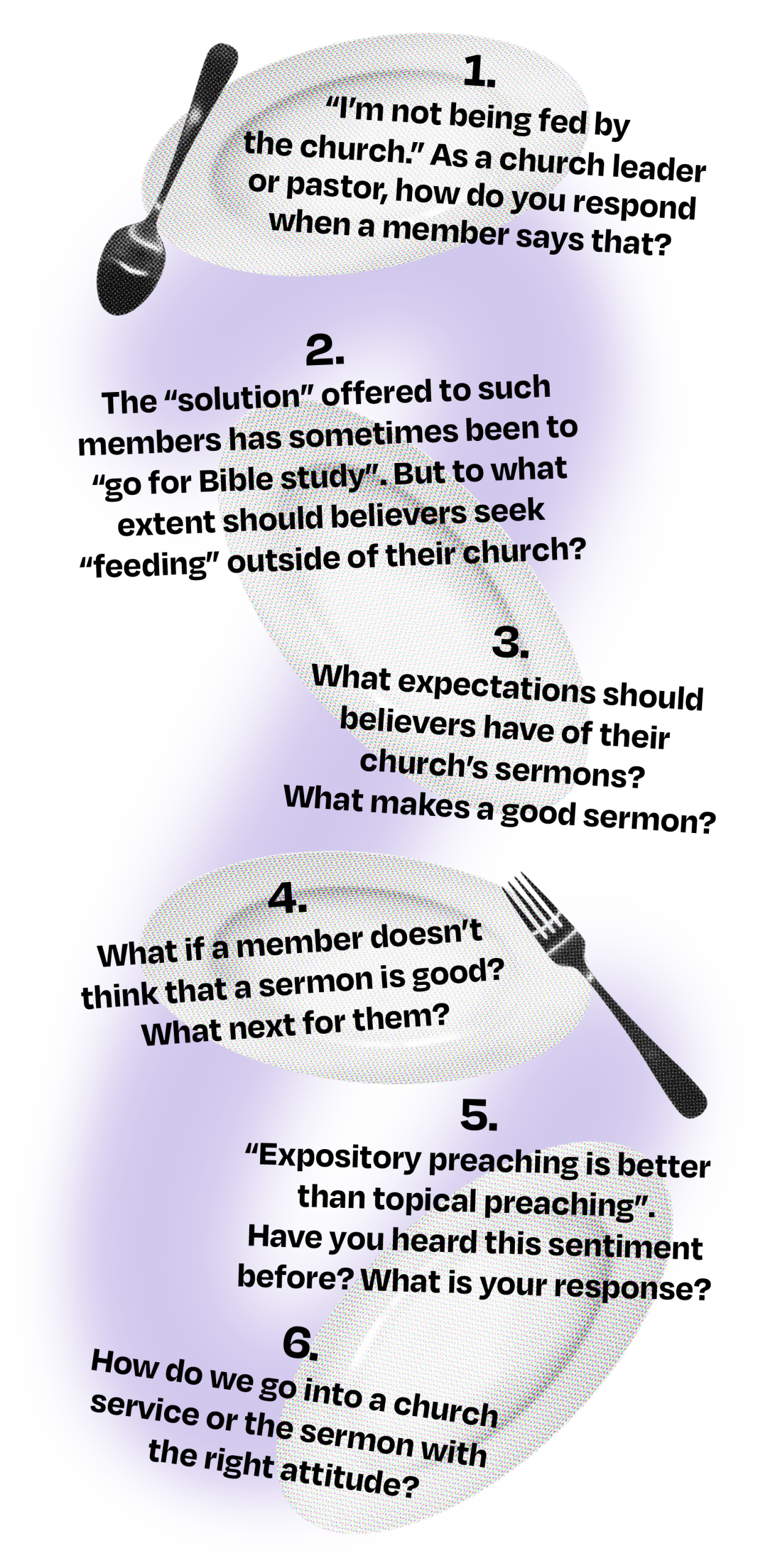Relationships

Studies & NS

Culture

What if I’m not being spiritually fed by the church? What if the sermons don’t speak to me and just aren’t very good? Should I go elsewhere for Bible study or to be fed? What do I do next?
This question about the pulpit is an important one for many believers, so we put together a panel full of passionate preachers to tackle it:
With decades of preaching and thousands of sermons under their belt, their insights are sure to refine and challenge – so we expanded the topic by asking a few more related questions:

With that, let’s get right into it!
PS RICK TOH: As a leader, it is important not to be dismissive but to hear the member out and understand what he or she meant by that. Is the member giving feedback about the church’s pulpit? Does the member feel that there is a lack of platforms in the church for spiritual development? Is the member expressing his or her hunger and desire to know God deeper?
I see the member’s statement as an opportunity to do the following (in this order):
REV CHRIS CHIA: That may be quite a common complaint, or even understandable lament, today!
There are three perspectives – the listener, the preacher and God – needed to understand this issue holistically.
First, we may have to realise that the listener may be a long time Christian or a visitor/seeker exploring Christianity. The Christian may be experiencing spiritual boredom, stagnation and sermon fatigue from uninspiring sermons.
The seeker or visitor, on the other hand, may be experiencing a spiritual fog or blurness from incomprehensible sermons filled with theological jargon that do not address their life’s questions or struggles about God and faith.
Either way, both the Christian and seeker are starting from an understandable starting point – the “self” or “me”. It is not wrong per se, nor should it be brushed aside as a “consumerist” attitude.
What they are experiencing and expressing is a spiritual disconnect between their expectations and reality. They come expecting to be fed. They walk away starved.
They come longing to encounter God in His Word. They walk away missing God even more.
They come for some “value add”. They walk away “minus value” – having wasted precious time attending a Sunday Service.

That leads us, secondly, to the calling and ministry of the preacher/pastor. We have to be ever prayerful and mindful before God of what He calls us to. Preaching and pastoring is supremely a sacred task. It is given by God. It is watched over by God. One day, when Jesus returns in glory, we will be accountable to God.
I think our sacred task as preachers is to take people from where and who we are in life to where and who we can be in Christ.
Put theologically, we take them by God’s grace, from an anthropocentric (me-centred) to a theocentric (God-centred) mindset. We take them from sinfulness to holiness. From the messiness of life to the newness of life under God.
We do that by teaching the Bible and proclaiming the gospel or Good News, which is always about Jesus Christ as God’s rightful Lord of our lives (Luke 24:44-48).
So, thirdly, it is God’s perspective that ultimately matters. The gospel is God’s unshakeable redemptive plan which takes from who we are in sin without Him to who we can be in holiness with Him. Jesus is central to God’s incomparable redemption.
We see this in every Bible character and story: from Abraham and Sarai’s childlessness to their limitless spiritual children fulfilled in Christ (Galatians 3:26-28); from Moses’ initial self-sufficient failed rescue to his God-dependent miraculous leadership of Israel’s exodus from Egypt; from Saul’s persecuting self-righteousness to his God-infused righteousness that saved the Gentiles.
In short, godly and good preaching should always land on Jesus.
We may come broken – from the sinfulness of world and weaknesses in our hearts – into a service. We should leave whole – from being graced by God’s Word and God’s Spirit – by being pointed to Jesus, again and again.

REV JONATHAN WONG: I would ask them to share more about what has led them to say this.
There could be many reasons for such a sentiment. If it is because our church doesn’t offer enough opportunities for them to learn, grow and be discipled, then I would work to address those shortcomings.
In my experience, most times when this has been said to me, the member actually has issues with the weekly sermons. And this type of criticism can be difficult for a pastor to receive.
It takes great humility to hear such feedback and to properly evaluate the truth of those claims, without being defensive or dismissive. Yet I think the willingness to learn and grow as a preacher is very important. And this means swallowing our pride so as to allow others to contribute to that growth.
… the willingness to learn and grow as a preacher is very important.
But there is a caveat to this. We should also check the criticism “in the presence of two or three witnesses” (2 Corinthians 13:1) — trusted people who aren’t afraid of giving honest feedback are invaluable.
I have a pastor friend who recruits trusted members of his congregation to provide regular feedback on his sermons. He even has a form that he gives them to fill out several times a year. He has set a high bar that I aspire to, and he is probably one of the most effective and engaging preachers that I know, even though he doesn’t have a large church or a well-known ministry!
REV JONATHAN WONG: We are blessed in Singapore to have many such opportunities. While I am all for people taking responsibility for their own growth and learning, I would also hope that it doesn’t come at the expense of being discipled in a community of faith. What I mean is this: discipleship goes far beyond just expanding our breadth of Bible knowledge.
James in his epistle warns us not just to be “hearers” of the Word who become susceptible to self-deception. Our Christian maturity also requires us to put what we know into practice. And we need a community of fellow disciples to hold us accountable and to spur us on in this.
Likewise, we should also remember that we are equally responsible for the “feeding” of others in our communities of faith.

We live in a very busy and fast-paced society. So in most cases, participating in “extra-curricular” learning comes at the cost of spending meaningful time within the faith communities where God has planted us.
A good way in which we could address this lack is to challenge our people to take up the task of teaching others.
I grew tremendously before I entered formal theological education by just leading Bible studies myself. The discipline of preparing and studying God’s Word to teach others helped me flourish in my faith and discipleship.
Does this mean there is no place for non-church-based Bible studies? Of course not! I believe they fulfil an important role in equipping the saints. However, if all they do is “feed” believers, providing input without any meaningful output, then I worry about the overall health of the individual who partakes and the communities of faith from which they come.
I was recently reminded that Paul’s injunction to Timothy, “And the things you have heard me say in the presence of many witnesses entrust to reliable people who will also be qualified to teach others” (2 Timothy 2:2), was not a recipe for individualised, one-on-one discipleship. Rather it was meant to encourage discipleship in the community, “in the presence of many witnesses!”
REV CHRIS CHIA: We should realise that whether we learn from sermons or Bible study, our God is supremely a God of Word.
He created the universe by Word. He blesses and disciplines His people by His Word. He punishes his enemies by His Word. In these last days, He has spoken to us by His Word become flesh, Jesus (Hebrews 1:1-4).
We must get our doctrine of God right before we sort out how to grow in obeying his Word, His Son and fulfil His great commission.
There are three main settings for “hearing” God’s Word.
The first is the “big group” setting. These are our weekly services where we listen to the preached Word. The mode of delivery is a “monologue” – one way from the preacher to us.
The second is small group Bible study with others. The mode of communication is a dialogue — two way between us and fellow believers.
The third is our personal devotion or quiet time with God. At heart, this is communion with God. It involves monologue from reading His Word and dialogue when we pray in response.

Ideally, a vibrant personal devotion should overflow to a blossoming small Bible group and climax with a spiritual feast on God’s Word at services.
We should not disconnect the three. God designed the hearing of His Word in all settings. They are complementary.
PS RICK TOH: I believe para-church organisations are from God. Para-church organisations are not churches, so they have the privilege to focus on a specific task and do well in that.
However, I believe they exist to complement and not compete with the church.
When their existences lead to an unhealthy comparison with the local church or cause the members to become disengaged with their local churches, then the para-church organisation has lost her bearing.
I am glad that many para-church organisations are taking intentional steps to partner with the local churches to support the latter to do well in the specific task like discipleship or Bible study.
REV CHRIS CHIA: True disciples should long for Word-centred, Christ-centred and God-glorifying sermons.
These are sermons that convict us of sin, assure us of salvation and empower us to fulfil God’s mission. Sermons should be rooted in God’s Word and relevant to God’s world.
Sermons should inform our minds, touch our hearts and move our will to love God. Sermons should not so much “domesticate” or bring God down to our lives, but glorify Him by bringing us up to Him with all our struggles and sins, warts and all.
People should walk away from a sermon with the risen hope that the immeasurable love of Jesus (Ephesians 3:15-20) is God’s answer to everything.

Pray for pastors and preachers to be wholly committed to:
PS RICK TOH: The sermon must be founded on Scripture. We must be careful lest our sermons become feel-good motivational speeches filled with new age influences peppered with some light Scripture references.
The sermon demonstrates thorough exegesis of the text. First by discovering what the text meant for its original author and audience before deriving timeless principles from it that are in alignment with the whole counsel of Scripture.
The sermon relates to the world today. The sermon helps the hearers see the relevance of God’s truths in the world today. The sermon helps the hearers know how to apply the timeless principles into their respective situations.
REV JONATHAN WONG: In the Anglican tradition in which I minister, one key mark of a church is that it is a place “in which the pure Word of God is preached.”
But what is the “pure Word of God?” I think we need to make the distinction between preaching that expresses good opinions versus that which conveys God’s opinions. I believe that all preaching needs to be anchored in Scripture.
This means that a good sermon must go beyond just merely referencing a biblical text, while making points and lessons that have little or nothing to do with actual Scripture being used.
And yet because we agree with the points, or have found ourselves entertained by the humour, or captured by the pithy illustrations, we brand the sermon a “good” one.
We can be too focused on the delivery of the sermon, as opposed to what the content of the sermon is about. I am in no way excusing poor delivery or communication skills in preaching. What I am concerned about is that we are prone to allowing how something is said, to overshadow what is being said.
I remember a lesson my late father taught me when I was younger, when we were visiting a church in another country while we were away on holiday.
I was unimpressed by the preacher and had much to say about his style and delivery of the sermon. My dad listened patiently to my rant for while, but as soon as I was done asked me this question: “Was the Word of God proclaimed and read in the service?”
I had to admit that it was. Then he pointed out to me that the Bible promised us that when God’s Word goes forth, it always bears fruit, accomplishing God’s purposes and desires (Isaiah 55:11).
I was chastened and have tried to make sure I remember this principle, not only as a hearer of sermons, but more importantly as one who regularly delivers them as well!
REV CHRIS CHIA: Members have to search their hearts that their reasons are objective not subjective. Objective – I am not hearing the gospel, I do not know, love and worship God and Jesus more. It’s still about me and problems. Subjective – my needs have not been met.
REV JONATHAN WONG: I would encourage them to pray for the preacher! It is God who enables. But it is also helpful to have a mechanism to provide constructive feedback to help your preacher improve.
PS RICK TOH: I see expository preaching as book study and topical preaching as systematic theology. I think both should exist at the pulpit.
I believe the negative sentiment towards topical preaching comes from bad examples of topical preaching whereby the preacher simply picks and choose Scripture passages to justify their points without respecting the literary context of those passages.
Contrary to popular belief, topical preaching demands as much, if not more exegetical work than expository preaching. The preacher needs to conduct a comprehensive study of the Bible that is coupled with robust exegesis of Scripture passages relating to the specific subject matter. I personally find topical preaching more difficult and that it requires more time to prepare.
… we should guard against only giving the congregation a steady diet of parts of Scripture that we favour or that which consists only of the flavour of the month. This can be true irrespective of whether we preach expository or topical sermons.
REV JONATHAN WONG: I believe both are good and necessary. However, I also believe in preaching the whole counsel of God.
This means we should guard against only giving the congregation a steady diet of parts of Scripture that we favour or that which consists only of the flavour of the month. This can be true irrespective of whether we preach expository or topical sermons.
It is something all preachers should be mindful of in planning sermon series or drawing up a preaching plan. As an Anglican I am partial to preaching from the lectionary in my tradition, which provides a good sweep of the whole of Scripture.

REV CHRIS CHIA: There are many schools or thoughts about preaching. Expository preaching seeks to preach the whole counsel of God. It tells of God’s salvation story — from Genesis to Revelation climaxed in the work of Jesus on the cross.
Expository preaching walks through a book, passage by passage, verse by verse. It explains what God’s Word meant in the original context to the first readers. Then, we explain what this means for our context today by locating God’s Word in the overall context of the Bible’s redemptive story. This should ideally be a church’s main diet.
Topical preaching focuses on a “hot potato” issue or need – singleness, marriage, divorce, aging, studies, money, work, stress, depression, mental health, wars, pandemics. There is a place and need for this. Topical preaching can be our supplementary diet, adding to our main diet of expository preaching.
Regardless, both methods must not miss being Christ-centred so that our sermons and lives do not slip into human effort, good works, moralism or self-improvement.
But sermons should always be firmly fixated on being so graced by Christ’s love and the Spirit’s power for God’s service, mission and glory.
Preachers have to work harder with topical sermons not to take things out of context. Beware: a text out of context becomes a pretext for false teaching.
REV CHRIS CHIA: We should always pray to be confessional and repentant. Begin with the reality that we are bad listeners, until God graces us to be so enlightened by the Gospel. Jesus kept saying: “He who has hears, let him hear!”
A pastor/mentor taught me to teach the church that “half the sermon is preached by the congregation”. Our attitude to pastors/preachers and church matters! Do not go to church either as a critical or a naïve believer.
For the critical member, Mark Twain’s warning is helpful: “It is not the parts of the Bible that I don’t understand that worry me. It’s the parts of the Bible that I do understand that worry me.” For the naïve believer, it is wise to be like the Bereans who searched the Scriptures.
REV JONATHAN WONG: As important as the sermon is, we cannot make the sermon the sum total of ministry of the Word in the church. Pastor Timothy Keller points out that it is unbiblical and that “we must beware of thinking the Sunday sermon can carry all the freight of any church’s ministry of the Word”.
He points out that all Christians have the responsibility to “let the message of Christ dwell among you richly” and to “teach and admonish one another with all wisdom” (Colossians 3:16). This is the basic foundation of the ministry of the Word.
There is a collective prayer which we use in the Anglican liturgy, originally written by the English reformer Thomas Cranmer which asks God to grant us the grace “to hear, read, mark, learn and inwardly digest” the Scriptures. This should be the attitude of every Christian coming into the service.
PS RICK TOH: Depend on the Right Person. It is the Holy Spirit who grants us understanding and insights on God’s Word. We should not look to the preacher, but the Holy Spirit to speak to us. Be prayerful as you listen to the sermon, commune with God and seek to hear His voice. Ask the Holy Spirit to speak to you and change your heart. Pray also for the preacher.

Self-awareness and humility are also important. Know your learning style. Our preferred learning style may impact our readiness to receive. Some of us are more systematic and find didactic sermons helpful, while others who are artistic may find narrative preaching more appealing.
The Bible consists of both narrative and didactic teachings. We should not limit God based on our preferred learning style.
Also, we need to be aware of the biases and baggages that may hinder our receptivity towards God’s Word. It is good to discover them in our lives and come humbly before God in openness to allow His Word and Spirit to transform us from within.
Finally, beware of consumerist behaviour.
It is sad that some believers are flocking from one church to another just because they find the preacher or the pulpit more appealing.
Seeking edification without engagement is consumerism.
We must not place the preacher above the Word nor should we place the pulpit on the pedestal. While the pulpit is an important feature of a church, it is not the only channel for divine communion. God also uses the corporate worship, holy communion, service, outreach and the community of saints to commune with us.
Therefore we need to engage ourselves fully in the body life of the church in order to experience the fullness of Him in our lives. Seeking edification without engagement is consumerism.